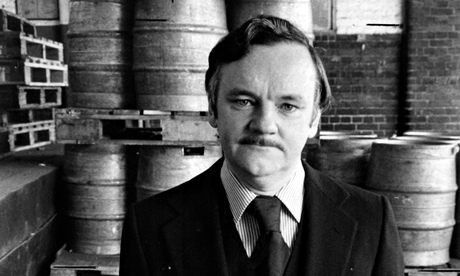
In whatever direction the businessman Allen Sheppard had chosen to take his career, he would have been certain of one thing: that he was going to be in charge. Such was his natural authority that those around him at companies such as Ford, British Leyland and Grand Metropolitan had no problem in accepting the same thing.
Once voted in a Sunday Times poll as “Britain’s toughest boss”, Sheppard, who has died aged 82, was in fact no hard driving, misanthropic manager, motivated entirely by the bottom line. He could be surprisingly self-deprecating, had a sense of humour that was obvious in the twinkle in his eye, and would pull the leg of anyone of any rank in the social hierarchy, up to and including the Prince of Wales, with whom he worked through the Prince’s business charities.
Sheppard described his management style as a “loose grip on the throat”. Those who worked with him knew exactly where they stood, and what was expected of them. But on the other hand he was a boss who would stand up for his employees. When his director of communications at the property and leisure conglomerate Grand Metropolitan was fired by the then chairman just before the annual shareholders’ meeting, Sheppard demanded his immediate reinstatement, on the threat that his own resignation would be announced too. He meant it, and the reinstatement went ahead with no further discussion.
Sheppard was the son of John, a train driver, and Lily (nee Palmer), a part-time bank clerk. His mother’s hopes of becoming a teacher had been thwarted by a lack of money to pay for training, and she was determined that Allen’s prospects should not suffer similarly. He went to Ilford county high school in Essex, and while there joined the Labour party (a result of his mother’s influence), establishing a reputation as a dedicated young activist who might go far in politics. He gained an economics degree from the London School of Economics and in 1958, after completing his National Service and two years as a college lecturer, joined Ford as a financial analyst at the company’s Dagenham plant.
A decade later he switched to the car manufacturing Rootes Group, and then, in 1971, joined British Leyland as marketing director of its international division. By then he had begun to lose faith in socialism. Although he remained a passionate supporter of equality of opportunity, he was a firm believer in the words of one of his LSE lecturers that “the size of the cake is as important as how it should be divided”.
In 1975 he was invited to join the group with which his name will always be linked, Grand Metropolitan. His first job there was as chief executive of the Watney Mann & Truman Brewers subsidiary. There he caught the eye of Maxwell Joseph, the extraordinary deal-maker who had built Grand Met into a multimillion-pound business. Sheppard was promoted to group managing director in 1982 and chief executive in 1986. One year later he added the chairmanship to the chief executive’s role, holding both jobs through to 1993. He remained chairman until he retired in 1996. While at the group, he instituted and saw through a radical and successful reshaping of the entire enterprise in the belief that “in business, one cannot stand still”. In 1997 Grand Met merged with Guinness to form Diageo.
Throughout the latter period of his working life, he put into practice his feeling that business should be working in the interests of the communities in which it operates, and that everyone deserves a chance to succeed. In the early 1990s he became involved in the Prince’s Youth Business Trust and the International Business Leaders Forum. He was chair of Business in the Community from 1994 to 1997 and served on the council of the Prince’s Business Trust from 1995 to 1998. He was also passionate about promoting London, serving on the board of a number of London-focused organisations, including London First, a non-profit body that aims to make London “the best city in the world in which to do business”.
He accumulated a number of non-executive directorships and picked up several honorary doctorates from universities. He also became increasingly interested in the Conservative party, accepting an invitation to join the party’s board of management. His business success, political activities and charitable work brought him a knighthood in 1992 and, two years later, a peerage. He took the title of Lord Sheppard of Didgemere and sat on the Tory benches.
Sheppard is survived by his second wife, Mary (nee Stewart), whom he married in 1980.
• Allen John George Sheppard, Lord Sheppard of Didgemere, businessman, born 25 December 1932; died 25 March 2015

